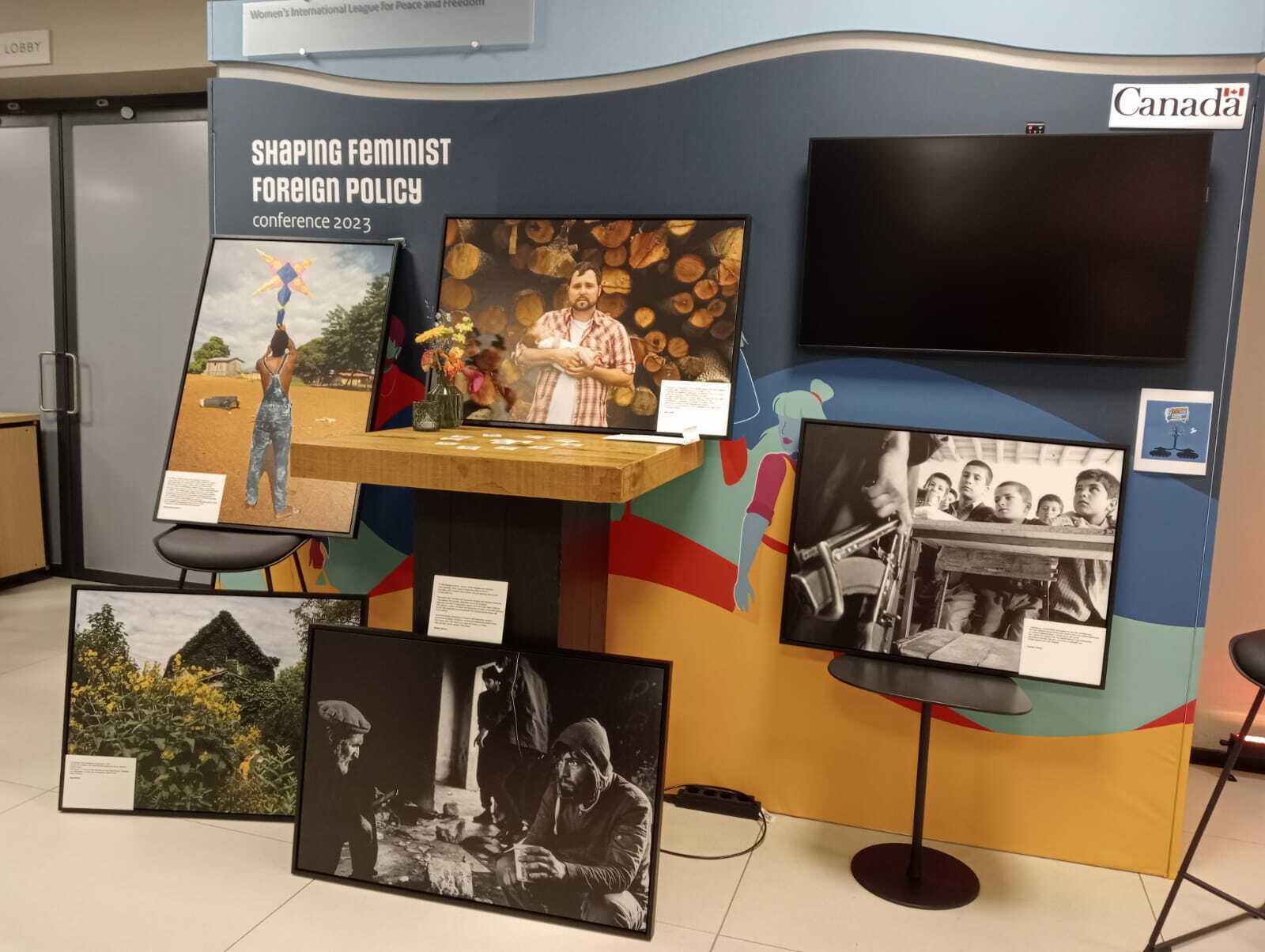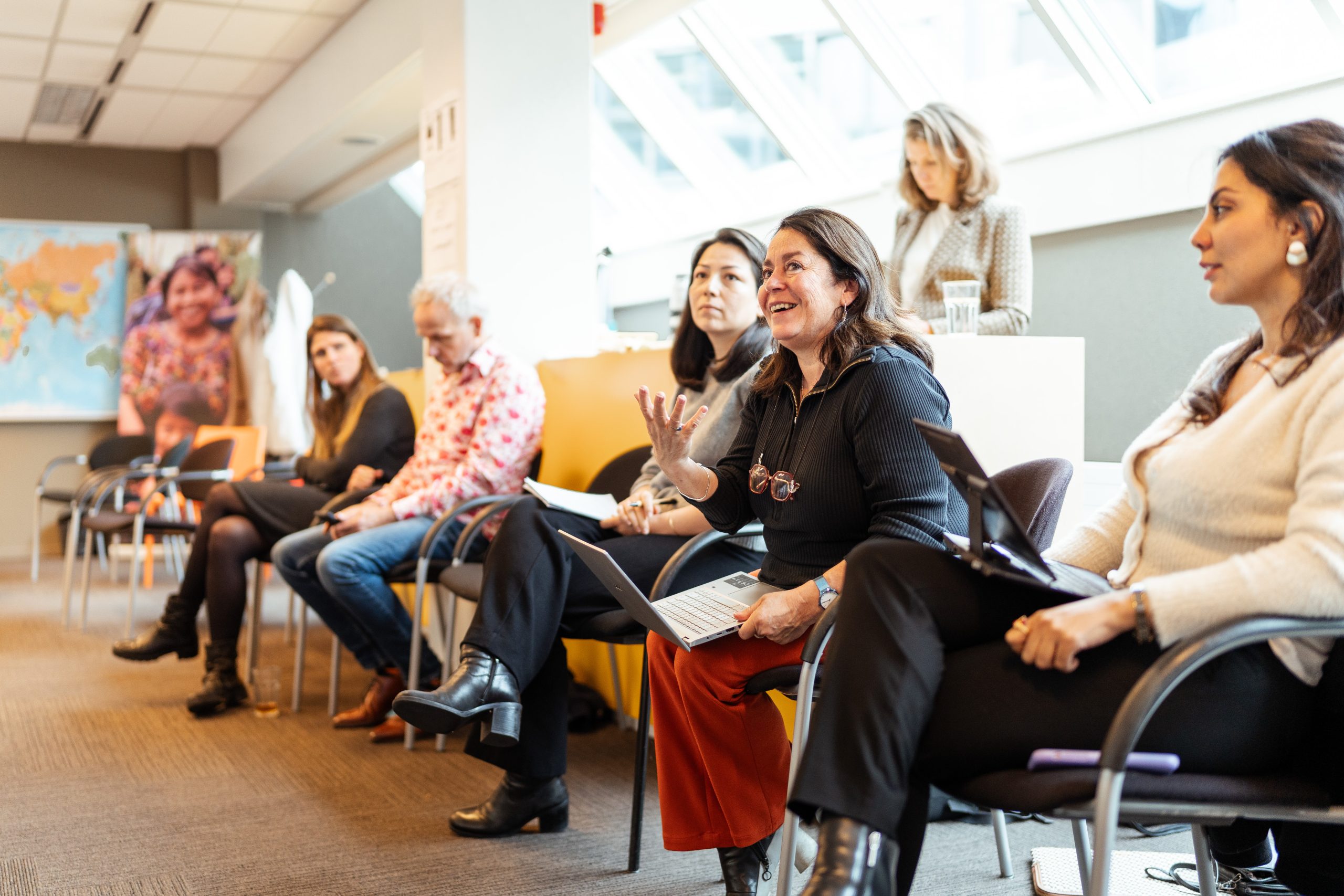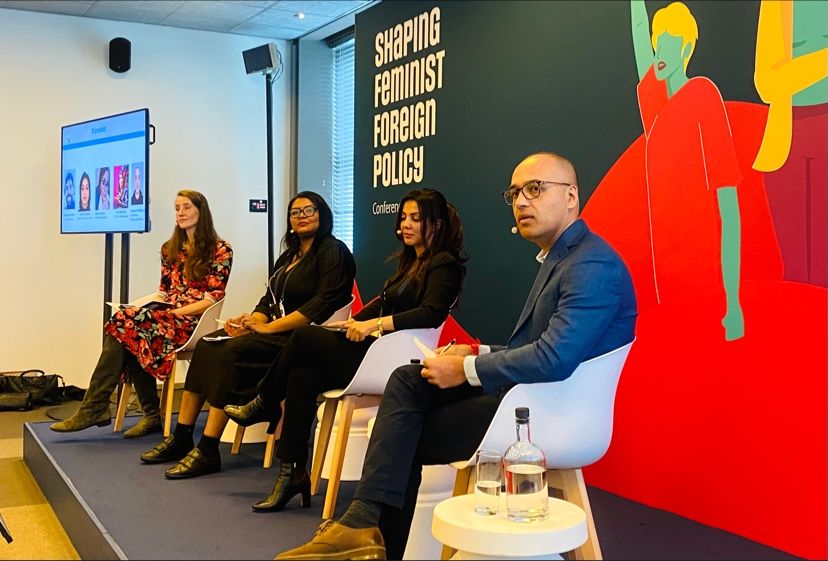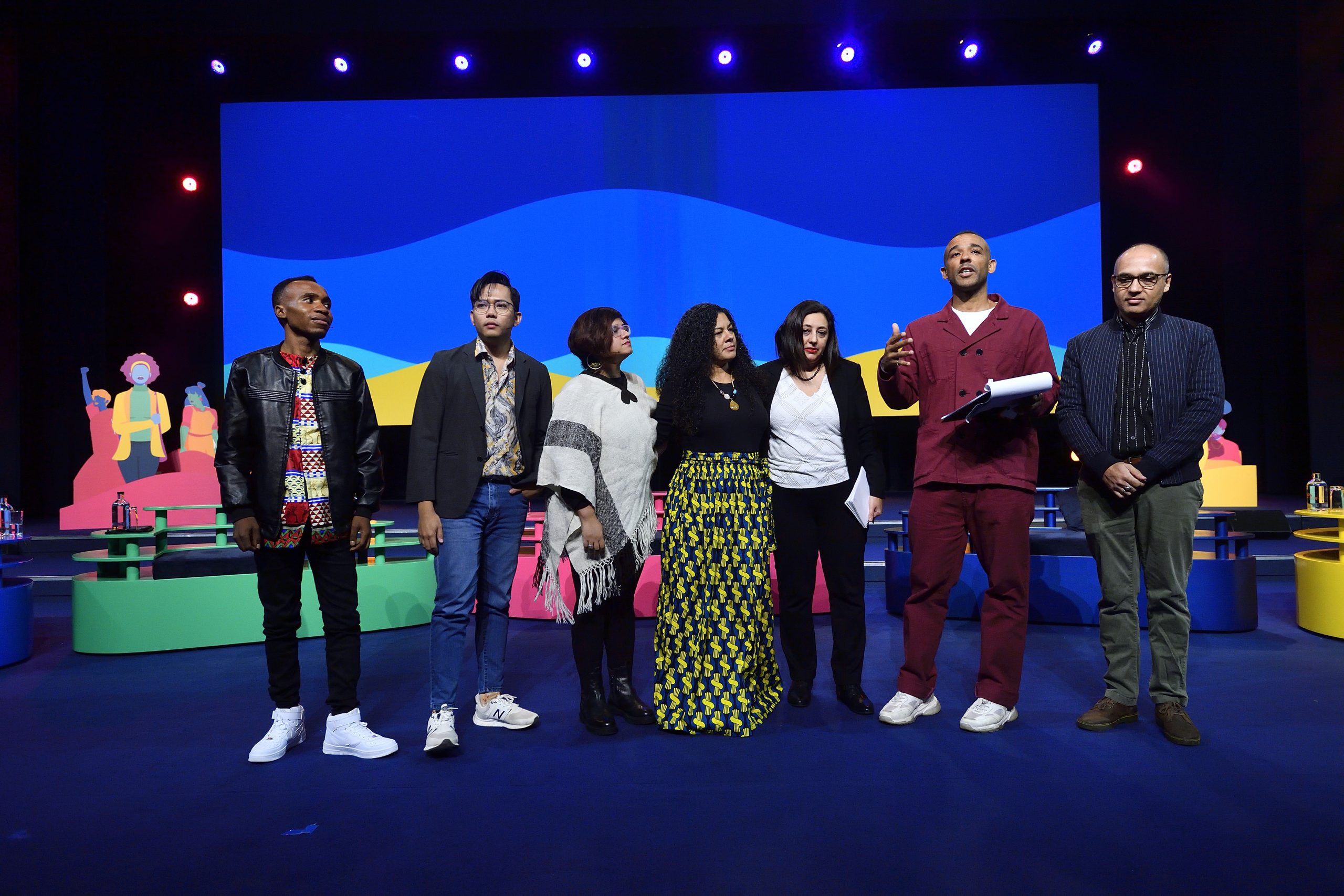At the 2023 Shaping Feminist Foreign Policy (FFP) Conference, WILPF and its partners put militarised masculinities at the center of the conversation on Feminist Foreign Policy. The conference was held this year in the Netherlands from 1- 2 November.
During the conference, Power and Patrol, which showcases the work being done to mobilise men for peace in Afghanistan, Cameroon, Colombia and the DRC was screened. Select photographs from the 2022-2023 WILPF’s photography competition were also exhibited in the venue.

Afghanistan and Yemen at the FFP Community Festival
WO=MEN – Dutch Gender Platform organised the Feminist Foreign Policy Community Festival ahead of the conference on 31 October, giving space and opportunity to civil society organisations – WILPF included – to share their views on what a truly feminist foreign policy should look like.
Along with its partners, PAX for Peace, Peace Track Initiative (PTI-Yemen) and WILPF Afghanistan (in exile), WILPF held an event titled “Feminist Foreign Policy and the Prevention of Gender Persecution”, focusing on the experiences of women’s rights activists from Afghanistan and Yemen. At the event, discussions were held on militarised masculinities in these two contexts and how the use of the concept of gender persecution can help advocacy around women’s rights.

Jamila Afghani, the president of WILPF Afghanistan (in exile) said that the Taliban takeover deeply impacted the women in Afghanistan when it comes to their access to education, their ability to make a livelihood as well as their ability to move. She noted that “when the Taliban took over, everything went back[wards] and now women and girls are imprisoned inside their homes, but they are as resistant as the mountains of Afghanistan, their struggle is going on underground, girls and women are building a movement underground…..darkness is not forever.” In their struggle, they have been joined by men with different views to those of the Taliban, male allies inside and outside the country who are supporting women’s rights while putting their lives at risk. Afghani shared her work engaging religious leaders, ulemas (Muslim scholars), and how she and WILPF Afghanistan have contributed to developing a different interpretation of the Quran among their communities.
Fatema Jafari, former member of Herat Provincial Council in Afghanistan and a current intern at PAX noted that Afghanistan is diverse and in this regard, communities experience militarised masculinities differently based on ethnicity, culture and language.
“When it comes to Hindu and Sikh women, they were forced to leave the country and were displaced due to their religion, Hazara women faced genocide and forced mass displacement, mass killing, and targeting due to their ethnicity and their religion. Tajik women face mass killing and forced mass displacement while Pashtun women experience militarised masculinity through honor killings as well as child and forced marriages. The Taliban are Pashtun, but this does not mean that Pashtun women enjoy their lives. All Afghan women from different ethnicities and religions are suffering due to militarised masculinities,” said Jafari.
Linda Al Obahi, a Senior Mediation and Liaison Officer at Peace Track Initiative (Yemen), shared her concerns about the restrictions on Yemeni women’s freedom of movement and freedom of expression: “We are receiving stories about restricting the movement of women between governorates and women are not allowed to leave the country. They are limiting the role of women to the production of more fighters and if they are courageous enough to speak up, they arrest members of their families.” Al Obahi continued to note that women are absent from most of the governing structures in Yemen and restrictions on their movement and public participation would continue to sustain this status quo. She shared the work of PTI leading the drafting of a Feminist Peace Roadmap and also their hopes to engage more Yemeni men from all walks of lives and political parties to support their feminist agenda in Yemen.
Concerns were raised as to whether the use of the framework of gender persecution could be perceived as an interference by Western governments, but the panelists indicated that support from external governments and feminist activists was crucial to advance their causes. Sometimes, they indicated, they have to send the messages and demands around women’s rights to their governments through external actors.
On this note, Jafari added that there is a Convention on Apartheid and in this regard, the Taliban have to be held accountable through international laws and through ensuring that aid conditionality takes gender persecution into consideration.
Militarised Masculinities as a thematic session in the FFP conference

On day one of the conference, WILPF and Peace Track Initiative (PTI) joined the “Masculinities, Militarisation and Peacebuilding: Engaging Men towards Feminist Peace and Countering Militarized Masculinities” session led by ABAAD (Resource Center for Gender Equality) from Lebanon and PAX for Peace. During this session, the trailor of Power on Patrol was screened and then rich discussions ensued on the connections between militarism, masculinities and violence to pursue permanant peace within the FFP framework.
Linda Al Obahi noted that working with Yemeni male political leaders is not easy and this is where the international community can support in helping challenge the power dynamics and push for more women’s presence in the public spaces. Reem Abbas argued that the political marketplace in Sudan is militarised and this makes it difficult for women to be politically represented and FFP should ensure that the international community do not support peace agreements that reward men with arms and should invest in supporting non-violent civil politics because women are only able to take part in public spaces when politics are practised through words and not guns.
Moreover, Laxman Belbase, FFP conference ambassador and Co-Director of the MenEngage Alliance spoke about the importance of male allies in feminist peace and noted that as male allies, they were brought in by the feminist activists and they continue to be guided by them. Belbase also stressed the need to have a feminist foreign policy that strives to promote peace and non-violence and not merely try to accommodate international humanitarian laws that promote minimum standards in conflict situations.
Feminist Peace should be at the center of Feminist Foreign Policy
Maria Al-Abdeh who is the executive director of Women Now For Development, the largest Syrian women’s rights organisation and also a WILPF partner, was unable to hold back tears each time she spoke during the conference. Al-Abdeh was very worried about her own country, which is forgotten amidst many conflicts as well as the unfolding war on Gaza. Al-Abdeh’s message on Gaza was to push for a ceasefire for now, but to pursue a long-term political solution to prevent this ongoing humanitarian crisis. Al-Abdeh repeatedly stressed during the conference that governments with a feminist foreign policy can’t declare themselves feminist without challenging the patriarchal violence being perpetrated right now, as well as addressing the root causes of injustice and inequality.

WILPF has always championed feminist peace and its work on mobilising men is one component of its strategy to achieve sustainable feminist peace. Not only does feminist peace address conflict, but it helps challenge and transform the political economies of war – and the militarised masculinities in the center – to feminist political economies of peace and gender justice.
Next year, the Shaping FFP conference will be hosted by Mexico, the first state to adopt a Feminist Foreign Policy in the Global South. However, civil society and in particular women’s movements should ensure that FFP does not become another buzzword that is marketed to generate funding or gain political and institutional clout, but should be mainstreamed into different internal and external policies and – very importantly – in our economic and trade relations. Countries can’t be true to FFP if they still want to be part of the arms race and increase their wealth through trading with arms as a critical pillar of their national economies.
Tellingly, some of the countries that are piloting or have already established FFP have actually increased their military expenditure in the last years. Moreover, FFP has proven to be easy to sideline when more conservative governments – take power, as was the case in Sweden, which in 2014 became the first country to adopt FFP only to revoke this policy in 2022 amid efforts of the right wing government to cut spending on foreign aid, and increase its security expenditure in response to the war on Ukraine.
Our hope for the 2024 FFP conference is to continue working with civil society partners to hold governments with FFP accountable.








